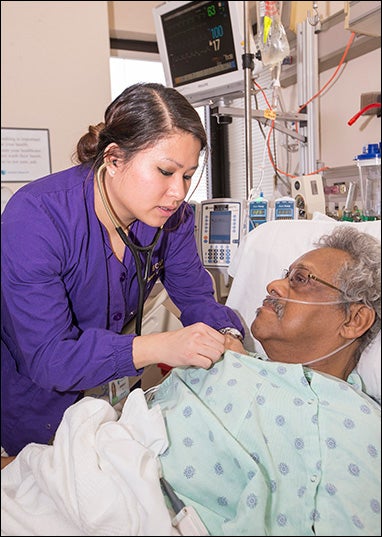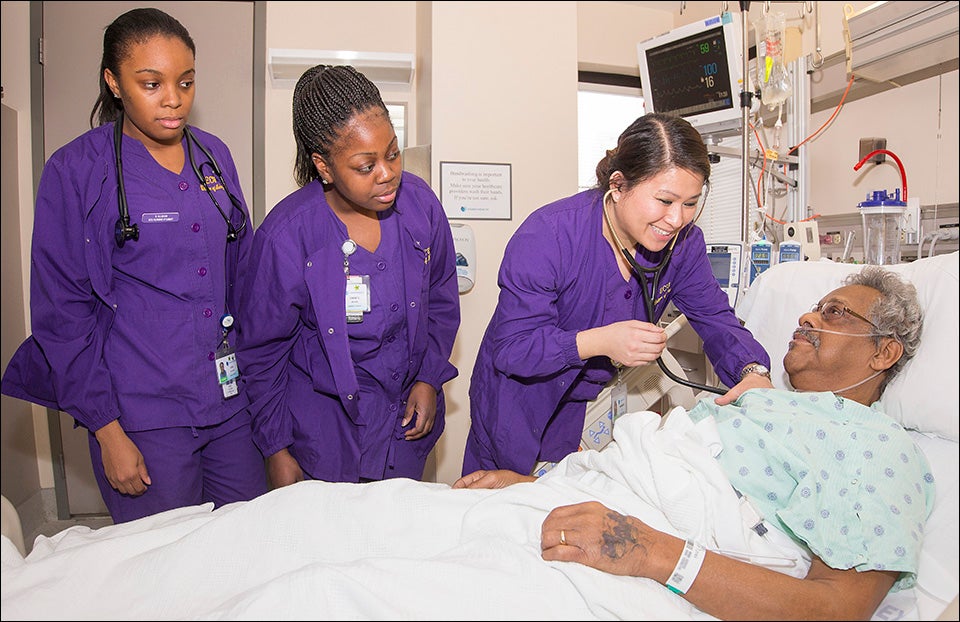SERVING A GROWING POPULATION
ECU joins national centers of gerontological nursing excellence
North Carolina’s elderly population is expected to double between the years 2000 and 2030, demanding an increase in health care services focused on older patients. The East Carolina University College of Nursing, now a member of the National Hartford Centers of Gerontological Nursing Excellence, is positioned to help address this need.
ECU received an invitation to join the prestigious organization earlier this year, and after demonstrating its gerontological nursing expertise in application materials, joined the likes of the University of Pennsylvania and Johns Hopkins University as a member.
“This is a real honor and a timely one as well,” said Dr. Sylvia Brown, dean of the ECU College of Nursing. “With the aging baby boomer population creating unprecedented demand on nursing services, joining the National Hartford Centers of Gerontological Nursing Excellence will help us capitalize on the level of excellence that we’ve already established.”

ECU nursing student Kimberley Le assists patient Roger Rice. The College of Nursing program at ECU requires nursing students to take at least one course in caring for older adults.
Membership also gives ECU access to educational resources and opportunities to network with leaders in aging and gerontological nursing, a field that is of increasing importance as demographics shift.
Globally, the world’s population is aging as birth rates remain low and mortality rates decline. Likewise, North Carolina’s elderly population – comprising those over 65 years of age – is the fastest growing segment of the state’s population. It is expected to expand from 969,000 in 2000 to 2.1 million by 2030.
All this aging puts pressure on the health care system. Geriatric patients often have multiple co-morbidities, or additional diseases that can complicate treatment (a patient being seen for a particular issue might have already been diagnosed with hypertension or diabetes, for example). Older patients also tend to take more routine medications and lack support systems.
“As a younger adult you still have siblings and maybe parents that can take care of you, but in an aging population they begin to lose that support system,” explained Dr. Patricia Crane, the ECU College of Nursing’s associate dean for research and creative activities, and a nationally recognized expert in geriatric nursing.
The resources from the Hartford Center will provide added support in an area where ECU College of Nursing programs already excel. All undergraduate students take a course on nursing care of the older adult. They also are provided multiple opportunities to care for geriatric patients through clinicals in a variety of medical and surgical settings. At the graduate level, the online master of science in nursing ranked 18th nationally by “U.S. News and World Report” in 2015 and includes an adult gerontology clinical nurse specialist concentration. The college’s doctor of nursing practice program offers an adult-gerontology nurse practitioner focus.
Additionally, a number of CON faculty members are experts who specialize in geriatric care. Several are certified as geriatric nurse practitioners, or have participated in the Hartford Geriatric Nurse Research Scholars program – an intensive summer seminar held at the New York University College of Nursing.
Patricia Crane, for instance, has received funding from federal organizations such as the National Institute of Nursing Research and the National Institute on Minority Health and Health Disparities for research in this area.
Among her most noteworthy research is a set of findings around the issue of aging adults and fatigue. After one of her studies revealed that multiple patients complain of fatigue after a heart attack, she decided to dig further. She discovered that about 70 percent of older adults have fatigue after a heart attack – fatigue that affects their ability to participate in life and take part in physical activity that could prevent another heart attack.
“Many times we assume that individuals are tired because of their age,” she said. “These are people who can say ‘no I was great until my heart attack, this is a different fatigue.’ It’s those kinds of things that I think are challenging our older adults.”
Nursing professor Dr. Sonya Hardin has worked with the American Association of Colleges of Nursing and Hartford Foundation to help create geriatric nursing educational modules and standards of care that are used across the country. She focuses on ethnogeriatrics, or health care for older populations from diverse backgrounds.
Explaining her focus area, Hardin said that how we view aging and think about the role of a geriatric person in society or within the family all comes from a cultural perspective. For example, cultural beliefs would deter some families from even considering placing their elderly parent in a long-term care facility.
“Health professionals should be able to communicate to clients in a culturally appropriate manner, advocate for ethnically sensitive polices and maintain up-to-date knowledge on the care of ethnically diverse older adults,” Hardin said.
Understanding both patients’ and their families’ wishes is a major factor in Allison Nelson’s job every day. Nelson graduated from ECU in December 2013 with her bachelor of science in nursing and works at Snug Harbor on Nelson Bay, a retirement community in Sea Level, North Carolina. She works with long-term and rehab patients and understands the importance of having health care staff who are equipped to handle the needs of older patients.
“Symptoms may come across different in the elderly,” she said. “And in residents with severe dementia they may not be able to tell you what is wrong or where they hurt. It takes staff that knows the age group and that works well together to notice problems early enough.”
The job has its challenges, she said, but she wouldn’t give it up.
“I never knew that geriatrics interested me until I started working with them,” she said. “There may be days that are hard to handle, but it is an amazing opportunity to help these individuals in one of the most difficult parts of their lives.”

ECU nursing students, left to right, Staci Allgood, Chanté Brown and Kimberley Le learn while working with patient Roger Rice, a member’s North Carolina’s fastest-growing population – those over 65 years of age.